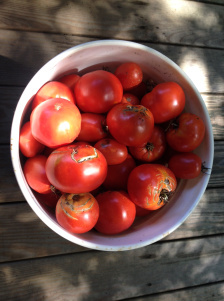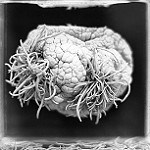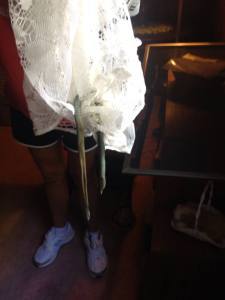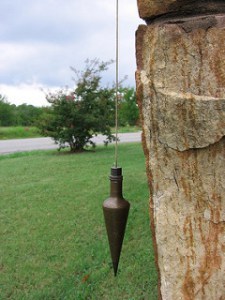Michele Huey's Blog: God, Me, and a Cup of Tea, page 54
September 13, 2015
Nothing Wasted
“Gather the pieces that are left over. Let nothing be wasted.” – Jesus, as quoted in John 6:12 (NIV)
We planted in hope and reaped in dismay.
As usual, we put in the garden around Memorial Day. Then the monsoons arrived. Now, those who live in these parts know the rain that deluged us for weeks and weeks was uncommon. Seeds and spuds rotted in the ground.
Then in mid-July and August the sun shone—and shone and shone. No rain. Not good for the garden.
We did get a healthy bean and pea harvest, and hubby enjoyed green onions and fresh cucumbers in his salad.
But the beets and green peppers were pitifully small. Even the zucchini and squash, of which I usually get way more than I can use, were sparse and a fraction of their usual size. Onions we let grow rotted in the ground and those we pulled rotted while drying out, even though I’d bought the “Keepers.” The skins on the two zucchini we picked were tough, as was the corn. Even the raccoons left the stalks alone.
 When I picked the tomatoes, I tossed quite a number of them because they were rotting or spotted. Not even I, who will save every usable bit of tomato as possible, could use those.
When I picked the tomatoes, I tossed quite a number of them because they were rotting or spotted. Not even I, who will save every usable bit of tomato as possible, could use those.
As I prepared the tomatoes for canning, I thought about when Jesus fed the multitude. When they were finished—John writes, “when they all had enough to eat”—Jesus told the disciples to “gather the pieces that are left over. Let nothing be wasted” (John 6:12).
Let nothing be wasted.
I thought about that phrase as I cut out the bad parts of those tomatoes.
I, too, have “bad parts”—character flaws, habits, mistakes that hurt me and others. But Jesus doesn’t toss me away because of them. Instead He lovingly cuts them out so mine will not be a life that’s wasted.
I thought about that phrase as I prepared those tiny beets for canning. I wouldn’t get the yield I wanted, but even those little beets would be used.
I thought about that phrase as I contemplated the things out of my control that affected the garden harvest—the weather, the country critters. So, too, things happen in our lives that are beyond our control and leave us spotted.
But that doesn’t mean God can’t use us.
Think you’ve got too many bad parts? Or you’re too small or too tough to be of any value? Or the stuff of life has marked you up too much to be usable?
Turn yourself over to the One who said, “Let nothing be wasted.”
For, unlike us, He plants in hope and reaps in joy.
When I’m feeling small and marked and unusable, Lord, remind me that “He who began a good work in me will carry it on to completion” (Philippians 1:6) until I am all He plans for me. That nothing in His hands is ever wasted. Amen.
Extra tea: Read and meditate on John 6:1–13


September 6, 2015
Praying Out of the Box

Image by jscreationzs courtesy of FreeDigitalPhoto.net
Now to Him who is able to do exceedingly abundantly above all that we ask or think, according to the power that works in us. – Ephesians 3:20 NKJV
There’s a scene in the movie Apollo 13 in which a group of space engineers are presented with an impossible problem and challenged to come up with a solution. Three astronauts’ lives depended on it.
Random spacecraft parts, seemingly meaningless to their objective of bringing home a severely damaged spacecraft safely, were dumped on the table in front of them. “This is what you have to work with,” they were told.
And they did it. But they had to think out of the box. They had to think beyond the scope of the normal, of what they knew and had experienced.
The phrase, “out of the box,” originated with a British mathematician who developed a nine-dot puzzle. All nine dots, on a three-by-three grid, must be connected with four straight lines—without the pencil leaving the paper.
The only way to do this is to extend the lines beyond the perceived boundary of the dots on the grid. I say “perceived” because we tend to see, or perceive, the outer row of dots as a boundary and the dots all lined up neatly “in a box.”
Only when you think “out of the box” and draw the lines beyond the imaginary boundary can you solve the puzzle.
But we feel safe in our boxes, don’t we? They’re what we’re familiar with, what we understand and can deal with.
Our boxes, however, limit us in many ways.
Take prayer, for instance.
How often do we pray “safe” prayers—prayers we feel comfortable praying because we’re not asking the Almighty to do the impossible? We’re not risking our faith and our Christian reputation on miracles we doubt will happen.
Well, the impossible is the Almighty’s specialty—and miracles are His delight.
The problem, my friend, is on our part—the doubt. Even a little, sniggly, wiggly, invisible-to-the-eye doubt that convinces us “this can’t be done.”
Of course it can’t be done—in human terms and in human (translate: possible) ways. That’s why we ask God to do it.
But too often we ask with doubt. Read the Gospels. See what Jesus had to say about doubt.
And I’m not saying that if you don’t have enough faith, your prayers won’t be answered.
What I am saying is that we need to pray out of the box—for the impossible, for the miracle. In other words, ask God to do His thing.
When a man in my church was experiencing serious health issues, we prayed over him as a congregation and anointed him with oil (See James 5:14).
I was surprised a few weeks later when he reported that doctors couldn’t find what they’d thought was a growth in his colon. What had been seen during medical tests was no longer there. They had no explanation for it, except divine intervention.
Why was I surprised? Doesn’t God like to answer “exceedingly abundantly above all we can ask or think”?
YES!
“According to the power”—His power—the power of growing faith—“that works within us.”
Have an impossible situation? Go ahead—pray out of the box. And watch El Shaddai do the impossible.
Praying out of the box stretches my faith, O Lord. Like a little used muscle, my faith needs to be stretched and exercised. Remind me that nothing is impossible for You and that You delight in answering in ways that are out of the box. Amen.
Extra tea: Read and meditate on Ephesians 3:14–21


August 30, 2015
Kindle Crash
“Come with Me to a quiet place and get some rest.” – Jesus, as quoted in Mark 6:31 (NIV)
One of the things I enjoy doing in the evenings after supper (besides watch the Pirates game) is putting a jigsaw puzzle together on my Kindle.
Yes, you read that right—there are jigsaw puzzle apps that can be downloaded to mobile devices. I downloaded only one puzzle app (a free one) on my Kindle, but it’s so much fun, I’ll put together three puzzles in one evening.
Now, working on a jigsaw puzzle is a good mind-stimulating activity, and such activities have been proven to sharpen the brains of us senior citizens. The problem with that is I don’t need my mind to be stimulated in the evening when I’m wanting—needing—to unwind, physically and mentally, after a full day’s work. And the glow from electronic screens, it’s been found, can interfere with the body’s production of the sleep hormone melatonin, causing insomnia.
After a couple of weeks of restless, broken sleep, I removed the jigsaw puzzle app from my Kindle, not only so I could get a better night’s rest, but also because the app was causing my Kindle to crash.
For those of you who blissfully aren’t into technology, a crash occurs when the device, whether a mobile phone, Kindle, or computer, stops working. Sometimes only the program being used stops. Other times, the whole thing freezes up and you have to shut it off and turn it on again. That’s called “rebooting.”
My Kindle also crashes when I get too many apps going at the same time or the battery gets low. And that jigsaw puzzle app sure drains the battery fast.
I’m just like my Kindle—there are times I “crash” too. Like when I take on a project that eats up precious time and energy but has little or no real value. Or when I get too many things going at the same time (I’m not a good multi-tasker). Or when I don’t give my batteries enough time to recharge before I’m up and running again.
Like my Kindle, I need to reboot—shut off the busyness and plug in to the Power Source long enough to recharge sufficiently.

Image courtesy of duron123 at FreeeDigitalPhotos.net
Studies have found that spending a week in the great outdoors camping and getting away from electronic devices and the too noisy, too bright world we live in can reset our biological clocks, restoring the natural rhythms our Creator gave us.
Too often we rush through day after day after day, we burn the midnight oil to get more done, and we exhaust ourselves in the process. There’s a reason God established the Sabbath rest: We need it—physically, mentally, and spiritually—or we, too, will “crash.”
“Come away with Me to a quiet place and get some rest,” Jesus told His disciples after a busy time of ministry.
He beckons to us today: “Come to Me all you who are weary, and I will give you rest. Let Me lead you beside quiet waters. Rest in verdant, peaceful pastures.” (Matthew 11:28,Psalm 23)
Do you feel as though you’re heading for a crash?
It’s time, my friend, to reboot.
When I’m heading for a crash, O Lord, unplug me! Amen.
Extra tea: Read and meditate on Genesis 2:1–3; 1 Kings 17:2–4


August 23, 2015
Keeping Peace in the Fish Tank

Image courtesy of khunaspix at FreeDigitalPhotos.net
If it is possible, as far as it depends on you, live at peace with everyone. – Romans 12:18 (NIV)
When my son and his family go on vacation, I take care of their fish.
There are two of them, a red one and a blue one, each about two inches long. They reside in separate tanks because if they were together, they’d attack each other.
Their clear, portable tanks have to be kept on separate counters so the fish can’t see each other. If they do, they get all puffed up, which means they’re agitated. And you don’t want agitated fish—you gotta keep peace in the fish tanks.
Not only are they unsociable, but they’re also finicky eaters and don’t like the same fish food, although they are, I believe, the same type of fish. (NOTE: My editor at the Indiana Gazette identified them as Bettas, a Siamese fighting fish.)
Bubbles, the red fish, likes the red powdery stuff that gets all over the countertop no matter how careful I am doling it out. Rob-Andrew MacHarper, my baseball nut grandson’s fish (named after his three favorite players—Roberto Clemente, Andrew McCutchen and Bryce Harper) will consume only freeze-dried bloodworms.
Some folks are like those fish—they get all puffed up and agitated for whatever reason and are about as approachable as a hungry piranha. When they’re in a room with someone they don’t get along with, they can get so disturbed as to attack the other person, if not physically, then verbally or mentally. They might try to keep it to themselves, but you can tell they’re agitated.
Now, I’m a peaceable person. I don’t like contention, controversy, or conflict. But I’ve learned that you can do all you can to get along with others, but sometimes it just isn’t possible.
Another person’s behavior is out of your control, but Scripture tells us to focus on what is in your control: “If it is possible, as far as it depends on you, live at peace with everyone” (Romans 12:18).
“As far as it depends on you” means that I do all I can to make peace. Sometimes that means avoiding that person, asking God to place His love for them in my heart and not dwelling on things that will agitate me.
“Live at peace with everyone”—no exclusions. Oh, pulleeze! How do I do that?
Paul tells us: bless—don’t curse—them, pray for them, put aside your pride, don’t be full of yourself, don’t seek revenge for wrongs, overcome the bad with good (Romans 12:9–21).
Jesus commanded us to love our enemies and pray for those who mistreat us (Matthew 5:44; Luke 6:27–28). He doesn’t command us to spend time with them, just to love them and pray for them.
Sometimes peace means living in separate tanks. Sometimes it means going out of your way to please a finicky person.
It ain’t easy, but you gotta keep peace in the fish tank.
Place Your love and forgiveness in my heart, O Lord, so I can obey Your command to love and pray for everyone—no exclusions. Amen.
Extra tea: Read and meditate on Romans 12:9–21
DO YOU KNOW someone who would enjoy these devotional thoughts? You have my permission to SHARE these posts with them via email, Facebook, Twitter, or other social media. Just use the button icons below. Remember you can sign up to receive these posts via email.
Looking over my fall speaking schedule, I see I have a few dates open. If you’re looking for a dynamic, inspirational, humorous, down-to-earth speaker with a powerful message, please check out my speaker page so I can continue to help all of you grow and experience the joy of your faith (Philippians 1:25 NLT).


August 16, 2015
Getting Rid of Parasites

Photo by Jim Fischer courtesy of Flickr.com
“Be holy, because I am holy.” – Leviticus 11:44 (NIV)
The 23-year-old son of my former pastor suffered a massive seizure while on vacation last weekend. An MRI revealed a mass on his brain. Surgery was scheduled immediately.
But surgeons didn’t find a brain tumor—they discovered a parasite, which had traveled from his stomach to his brain. Now that the parasite has been removed, a full recovery is expected.
I’d never heard of parasites on the brain—in the stomach or intestines, yes, but not the brain. So I did some online research.
According to the Merck Manual Consumer Version website, parasites make their way from the stomach to other parts of the body through the bloodstream. When they settle on the brain, symptoms such as headaches, nausea, vomiting, seizures, sleepiness, personality changes, and mental impairment could occur. Who’d ever have thought a parasite could travel to the brain and wreak so much havoc?
A parasite, as you know, is “an organism that lives off or in another organism, obtaining nourishment and protection while offering no benefit in return” (Dictionary.com). The online Free Dictionary definition goes a step further: a parasite “causes harm to its host.”
There are other kinds of parasites—the kind that feed off your mind and spirit, siphoning your joy and leaving untold harm.
Take hatred, for example. It grows over time, one slight, or perceived slight, at a time. If left unchecked—unconfessed, brought before God—it eventually will consume you. Hatred stirs up conflict, damages relationships, and is the cause of more unhappiness than this world realizes. The antidote for hatred is love. The wise King Solomon once wrote, “Hatred stirs up dissension, but love covers over all wrongs” (Proverbs 10:12).
Another parasite is envy. When someone has something you want but don’t have, envy takes root and grows, if we allow it. It breeds dissatisfaction within and discord with others. “Be content with what you have,” the writer of Hebrews says (Hebrews 13:5). Paul wrote to the believers in Philippi from a jail cell: “I have learned to be content whatever the circumstances” (Philippians 4:11).
Another parasite is resentment and bitterness. No matter what the cause, unchecked resentment—bearing grudges—mushrooms into bitterness, turning you into a sour person no wants to be around. We’ve all known bitter people—folks who hang on to wrongs done to them, refusing to forgive. Resentment runs deep, and spawns anger and hatred. “Get rid of all bitterness, rage and anger, brawling and slander, along with every form of malice,” Paul wrote to the Ephesian church (Ephesians 4:31).
These parasites that will suck the joy of life from you and give you nothing in return except heartache and broken relationships.
The remedy for a parasite is to remove it—every trace of it. The best—and only—way to get rid of these parasites is to ask the Great Physician to remove them and replace them with love—His love, divine love, agape love.
Search me, O God, and know my heart! Try me and know my thoughts! And see if there be any wicked way in me, and lead me in the way everlasting! (Psalm 139:23-24). Amen.
Extra-Tea: read and meditate on 1 Peter 1:13–2:3


August 9, 2015
Set in My Ways

Even to your old age and gray hairs I am He, I am He who will sustain you. I have made you and I will carry you. – Isaiah 46:4 (NIV)
Sunday couldn’t come soon enough.
Last week while our son and his family spent a week at the beach, back home hubby and I were the animal keepers.
They look after our pets when we’re away, so it’s only reasonable for us to return the favor. But tending to two cats set in their ways hardly compares to looking after two fish, four cats (two of which are ours), two dogs, a goat, a blind horse, a pony, and a flock of chickens.
How hard can it be? All I had to do is sprinkle a pinch of fish food in the fish tanks three times a day, fill the cat food bowls once a day, get the eggs from the barn, step over two dogs that followed me around like a couple of toddlers, run interference for my cats, who were not happy with our guests, and clean up occasional “presents” one of the canines left on the floor.
I would have taken care of the goat, too, but when she head-butted my six-foot-three husband that first day, I said, “nothing doing.” The barn animals were his job anyway.
Then there was the worry: that the fish would die on my watch or that the dogs would run off and I’d be responsible for the loss of their pets. Like when Zoey, the two-year-old Dogo Argentino who sometimes thinks she’s a lap dog, took off chasing a military jet zooming over the house treetop level. She returned when she figured she couldn’t catch it, but not before I practiced what I was going to tell my son.
I’m too old for this. One pet, but this zoo? A couple of days, but a week? I’m used to having a nice, quiet house and moving through the day at my own pace, being able to leave for a few hours without wondering what I’ll find when I get home.
I’ve become set in my ways—something young and carefree me I said would never happen. But there it is.
My spirit is willing, but this 63-year-old body protests anything out of the routine. I took three naps last week and spent a few afternoons plopped in my reading chair. My mind was unfocused and my muse unmotivated—not good for a writer. One night I took a long soak in a warm bubble bath.
Age creeps up on us all, if we’re blessed enough to live to our senior years. By this season of our lives, we’ve learned happiness is found only by squeezing it out of the here and now—not in some distant dream.
I may love my rut, but I know God has made this day for me to live (Psalm 118:24). I choose to rejoice and be glad in it—even if the visiting dog leaves a present on the floor in the middle of the night.
When my aches and weariness remind me of my age, O Lord, let them also remind me that You will carry me and sustain me during the Golden Years. Amen.
Extra tea: Read and meditate on 2 Corinthians 4:7–5:5 (below)
2 Corinthians 4
7But we have this treasure in jars of clay to show that this all-surpassing power is from God and not from us. 8We are hard pressed on every side, but not crushed; perplexed, but not in despair; 9persecuted, but not abandoned; struck down, but not destroyed. 10We always carry around in our body the death of Jesus, so that the life of Jesus may also be revealed in our body. 11For we who are alive are always being given over to death for Jesus’ sake, so that his life may also be revealed in our mortal body. 12So then, death is at work in us, but life is at work in you.
13It is written: “I believed; therefore I have spoken.”b Since we have that same spirit ofc faith, we also believe and therefore speak, 14because we know that the one who raised the Lord Jesus from the dead will also raise us with Jesus and present us with you to himself. 15All this is for your benefit, so that the grace that is reaching more and more people may cause thanksgiving to overflow to the glory of God.
16Therefore we do not lose heart. Though outwardly we are wasting away, yet inwardly we are being renewed day by day. 17For our light and momentary troubles are achieving for us an eternal glory that far outweighs them all. 18So we fix our eyes not on what is seen, but on what is unseen, since what is seen is temporary, but what is unseen is eternal.
2 Corinthians 5
1For we know that if the earthly tent we live in is destroyed, we have a building from God, an eternal house in heaven, not built by human hands. 2Meanwhile we groan, longing to be clothed instead with our heavenly dwelling, 3because when we are clothed, we will not be found naked. 4For while we are in this tent, we groan and are burdened, because we do not wish to be unclothed but to be clothed instead with our heavenly dwelling, so that what is mortal may be swallowed up by life. 5Now the one who has fashioned us for this very purpose is God, who has given us the Spirit as a deposit, guaranteeing what is to come.
(Scripture from BibleHub.com)


August 2, 2015
Snake Encounter
Judge n ot.
– Matthew 7:1 (NIV)
ot.
– Matthew 7:1 (NIV)
How it got in was a mystery, but the thin, green snake somehow got tangled in the living room curtain. Poor thing was dead when we found it, hanging from the bottom of the panel, its limp body half decayed.
I say “poor thing” although I don’t like snakes, even harmless ones, which this one was. Probably a garter snake. But the thoughts of it dying a slow, agonizing death bothered me.
This was my second encounter this summer with a snake that got too close for comfort. In June I opened the basement door to shake out a rug, and there to my right, curled up on the concrete patio against the block wall was what I thought was a copperhead. Yanking the door shut, I grabbed my iPhone, slid down the door screen, and snapped a couple of blurry pictures while the snake coiled its head up. I was sure it was getting ready to spit its venom at me. Facebook friends identified it, though, as an Eastern milk snake—harmless.
Actually, snakes aren’t all bad. They’ve gotten a bad rap ever since the Garden of Eden fiasco. (If you don’t know what I mean, read Genesis 3.)
Not all snakes are poisonous, for instance. We see a snake and immediately think fangs and venom shooting through your veins and a quick, painful death.
Snakes are really shy creatures. They’re as scared of you as you are of them, more passive than aggressive. I know we have lots of snakes around here—after all, we live in the country. That’s to be expected. But over the years I haven’t seen that many. They would rather remain hidden.
They won’t bite unless they feel threatened or provoked. You have to be careful where you step when you’re walking in the woods or through a field. You could inadvertently threaten one without knowing. But a snake won’t come at you like an angry mama bear.
Snakes are a good source of natural pest control. They eat insects and rodents. Think about those pests that munch on your garden plants, or the mouse droppings in your silverware drawer.
We’re too quick to label something or someone as “bad” based on hearsay or on our own, sometimes unfounded, fears or on incomplete knowledge. We don’t dig and get the facts. We don’t get to know the real person behind the talk.
The Son of God associated with tax collectors, whom the Jews of that day considered to be scoundrels not to be included in your circle of friends, the scum of society. But Jesus called one tax collector to follow Him (Levi, also known as Matthew; Matthew 9:9–13) and had dinner in another’s home (Zacchaeus; Luke 19:1–10), much to the consternation of the religious leaders and the confusion of those who followed Him. He was setting an example.
I like the way the Amplified Version phrases Matthew 7:1: “Do not judge and criticize and condemn others.”
Remember, even snakes have a good side.
Give me the eyes to see others as You do, Lord, and not to judge based on hearsay. Amen.
Extra Tea: Read and meditate on Matthew 7:1–5
Click here to view my SUMMER NEWSLETTER and catch up on what’s happening in my life.


July 26, 2015
More Than You Can Handle

Be strong and courageous. Do not be terrified; do not be discouraged, for the LORD your God will be with you wherever you go. – Joshua 1:9 (NIV)
“God won’t give you any more than you can handle.”
You’ve heard that said many times, I’m sure—maybe even have said it yourself. The words are meant to comfort someone going through a difficult time.
But it isn’t true.
Gasp! What?
Doesn’t the Bible say God won’t allow a something to be more than we can stand? You may cite 1 Corinthians 10:13. But that verse says God won’t allow a temptation to be more than we can endure—temptation, not trial. There’s a difference.
Trials and tribulations are the hard times we go through, the times when we’re stuck between a rock and a hard place. Temptations are enticements to do wrong, to sin.
Trials, tribulations and temptations are all times of testing. Therein lies the confusion.
The Bible doesn’t tell us that God won’t give us any more hard times than we can endure. At times He does. Think about grief, loss, betrayal.
What does the Word tell us, then?
That troubles will come: “Many are the afflictions of the righteous, but the LORD delivers him out of them all (Psalm 34:19). “In this world, you will have trouble. But take heart! I have overcome the world” (Jesus, as quoted in John 16:33).
To “cast all your anxiety on Him because He cares for you” (1 Peter 5:7).
To pray about it. “Do not be anxious about anything, but in everything, by prayer and petition, with thanksgiving, present your requests to God. And the peace of God, which transcends all understanding, will guard your hearts and minds in Christ Jesus” (Philippians 4:6-7). “Call upon Me in the day of trouble; I will deliver you” (Psalm 50:15).
Jesus Himself invites us to come to Him with our heavy burdens and He will give us rest (Matthew 11:28).
Oh, I could go on and on and on, citing Scripture.
But did you notice something about every Scripture I did quote?
Read the second part: God cares, delivers, overcomes, guards, gives rest.
Relief, strength, and victory come from God alone. Not our striving. Not our wit and wisdom. Not our own ingenuity.
Much is said and written about self-help. About overcoming in our own strength. About pulling ourselves up by our own bootstraps. About independence. We pride ourselves on how we can overcome difficulty without anyone’s help.
But we were never meant to be independent of our Creator. “In Him we live and move and have our being” (Acts 17:28).
When Joshua stepped into Moses’ sandals, he faced an overwhelming task: Lead the Israelites in battle to conquer the Promised Land.
Yikes! They faced crossing a river at flood stage, taking walled cities, and facing the giants of the land (the Anakim).
In short, it was a tall order—an impossible feat—without the help of El Shaddai.
And that’s what God wants us to realize as we face our Anakim, when we’re up to our necks in a flood-stage torrent, when we stare at a stubborn wall we can’t get through.
That with His help, we can do all things, but only through Him who gives us the wisdom, strength, and power to do so (Philippians 4:13).
He wants you to depend on Him.
Do you?
As I lift my eyes to the imposing and impossible mountain before me, remind me that my help comes from You. Help me to depend on You to overcome. Amen.
More tea: Read Joshua 1:1–9. The Psalms are excellent to read when facing the giants, especially Psalms 42 and 121.


July 18, 2015
True to plumb

“Plumb line on sandstone wall” by P. W. Hatcher (flickr.com)
I am setting a plumb line in the midst of my people. – Amos 7:8 (NKJV)
“An army of the world’s top climatologist agree: man-made global warming is a fraud.”
I clicked the link to read the article then googled the subject. A whole slew of articles popped up addressing the topic, some claiming man-made global warming is a scam, others insisting climate warming is, indeed, due to human activities.
Who to believe?
It’s like the “eggs are bad/good for you” debate. It seems for every theory, there’s an opposing one. Both sides use scientific studies to back their claims.
But theories change, don’t they?
I don’t know about you, but I want to build my life on something that doesn’t change.
What doesn’t change?
Truth.
But how do we know what’s true and what’s false? What basis do we use?
Me, I use the Bible.
There are those, I know, who don’t believe the Bible is God’s Word or that it’s relevant to us today. It’s like the global warming controversy and the debate over whether a certain food is good or bad for the human body. We look at the argument on both sides and choose.
I choose to believe the Bible is the Word of God and use it as the rock upon which I build my life-house.
Why?
First, because the Bible shows us our Creator’s standards. Like a plumb line. When a wall is built to standard and is straight, it’s said to be “true to plumb.” If it isn’t, it’s “out of plumb.”
“You can’t please everyone, so you’ve got to please yourself,” sang the late Rick Nelson in his hit song “Garden Party.” That might sound like a good philosophy, but think about it: What would the world be like if each person’s main focus was to please himself first, and “everyone did what was right in his own eyes” (Judges 21:25)? We’d be out of plumb.
Second, the Bible, unlike man’s theories, is enduring. “The grass withers, the flower fades, but the word of our God will stand forever” (Isaiah 40:8). “Forever, O LORD, Thy word is firmly fixed in the heavens” (Psalm 119:89). I want a life based on something that isn’t fickle, something that won’t change with every new study or theory.
Third, because God’s Word is enlightening, “a lamp to my feet and a light to my path” (Psalm 119:105). It gives me guidance, wisdom and knowledge. It lights my way in a world that’s getting darker and darker, clearing up the confusion that often besets me as I travel life’s road.
Fourth, because God’s Word is effective. God Himself said His Word will not return to Him void but will accomplish all that He desires for it to accomplish (Isaiah 55:10–11). It’s living and active, sharper than any double-edged sword and penetrates to the hidden places in our beings—our thoughts and attitudes (Hebrews 4:12)—the very places that need changed and cleansed.
And finally (not finally really, but finally for the sake of brevity), God’s Word teaches us what is true and to do what is right. It makes us realize what’s wrong with our lives and how to correct it (2 Timothy 3:16).
Either we’re “out of plumb” or “true to plumb.”
Which are you?
Help me, O Lord, to be true to plumb. Amen.
More tea: Read Amos 7:7–15; Luke 6:46–49
A NOTE FROM MICHELE:
For your convenience, I’ve added links to the Bible verses so you can read the verses referenced. Simply click on the Scripture reference (which is underlined). The Scripture will appear in a new window.
Thank you for visiting my new inspirational blog site on WordPress. You can subscribe to receive these weekly posts delivered directly to your email address. Simply click on the “Follow Blog via Email” at the top of the sidebar.
God bless you. Have a great week!
Michele


July 13, 2015
New home
Welcome to the new home of God, Me & a Cup of Tea.
From now on, I’ll be posting my weekly inspirational blogs on this site. The previous site will remain up so you can access past posts. However, all new posts will be posted here.
Remember, you can sign up to have these posts delivered directly to your email inbox. Just click on the FOLLOW button in Follow Blog via Email box in the sidebar.
Your feedback is welcome.


God, Me, and a Cup of Tea
- Michele Huey's profile
- 19 followers



